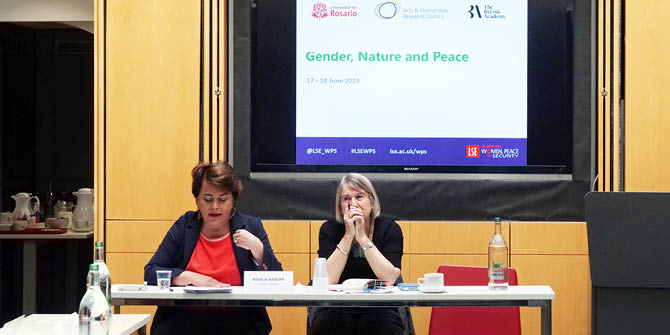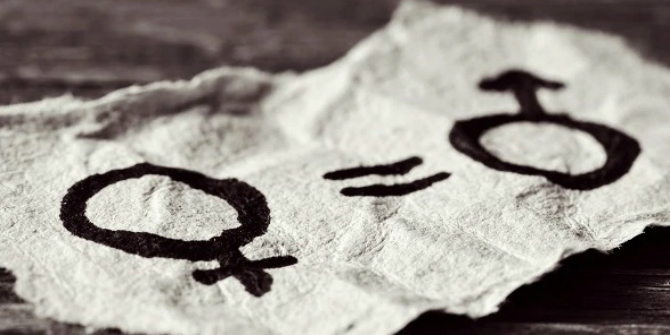General Recommendation 37 (GR37) marks the first time a UN body has addressed the links between human rights and the gendered impact of climate change. Keina Yoshida and Lina M. Céspedes-Báez review GR37 and address the growing conversation on climate change in the context of the Women, Peace and Security agenda.
On the February 7th 2018, the Committee on the Elimination of All Forms of Discrimination against Women (CEDAW) enacted its first general recommendation which focuses on climate change and the gendered impact of disasters entitled: General Recommendation No. 37 on Gender-related dimensions of disaster risk reduction in the context of climate change. The adoption of GR37 follows a number of programmes and statements which have called on States to advance gender mainstreaming into all areas and elements of climate action.
GR37 is a landmark instrument and marks the first time that a UN treaty body has addressed the linkages between human rights and climate change. It is a significant instrument which draws upon the Sendai Framework for Disaster-Risk Reduction, Paris Agreement, United Nations Framework Convention on Climate Change and the Sustainable Development Goals. It is also significant since it specifically sets out how climate change is a women’s human rights issue, and how it links to conflict, migration and displacement. It is an instrument which makes it clear that states parties can and should be held accountable for the impact that climate change has on women and girls.

General Recommendation 37
GR37 is shaped by three key general principles: equality and non-discrimination, participation and empowerment, and accountability and access to justice – as fundamental to ensuring that all interventions related to disaster risk reduction in the context of climate change are implemented in accordance with the Convention. The objective of the GR:
...is to underscore the urgency of mitigating climate change to highlight the steps that need to be taken to achieve gender equality as a factor that will reinforce the resilience of individuals and communities globally in the context of climate change and disasters.
Paragraph 12, GR37
The introduction of GR37 explains the gendered impact of disasters on women and girls, and includes the following:
- Women, girls and boys are affected differently by climate change and disasters, with many women and girls experiencing greater risks, burdens and impacts.
- As a result of limited control women have over decisions governing their lives, they are more likely to be exposed to disaster induced risks and losses related to their livelihoods and they are less able to adapt to changes in climatic conditions.
- Women and girls have higher levels of mortality and morbidity in situations of disaster. Gender based economic inequalities mean that women, and female-headed households in particular, are at higher risk of poverty and more likely to live in inadequate housing in urban and rural areas of low land value that are vulnerable to the impact of climate related events such as floods, storms, avalanches, earthquakes, landslides and other hazards.
- Women and girls in conflict situations are particularly exposed to risks associated with disasters and climate change.
- The failure to engage in gender-responsive disaster planning and implementation means that protective facilities and infrastructures such as early warning mechanisms, shelters, and relief programmes have frequently neglected the specific accessibility needs of diverse groups of women, including women with disabilities, older women and indigenous women.
- Women and girls also face heightened risk of gender-based violence during and following disasters.
- The categorization of women and girls as passive ‘vulnerable groups’ in need of protection from the impact of disasters is a negative gender stereotype that fails to recognise the important contributions to disaster risk reduction, post disaster management and climate change mitigation and adaptation strategies that women are already making.
Significantly GR37 makes it clear that any measures to combat climate change, including limiting fossil fuel use and greenhouse gas emissions and the harmful environmental effects of extractive industries such as mining and fracking, should comply with human rights. In other words, “greenwashing” cannot be used to undermine fundamental human rights and climate mitigation should instead contribute to empowerment. This speaks to the Committee’s pronouncement that gender equality is a pre-condition for the realisation of sustainable development goals. Meaning, amongst other things, that gender equality cannot be sacrificed in the name of green capitalism.
Natural hazards exacerbate pre-existing gender inequalities
GR37 provides an intersectional approach to disaster reduction. It states that situations of crisis exacerbate pre-existing gender inequalities and compound intersecting forms of discrimination. The Committee recommends that states parties should ensure that all policies, legislation, plans, programmes, budgets and other activities are grounded in human rights based principles including equality and non-discrimination, “with priority being accorded to the most marginalized groups of women and girls.” This is evidenced throughout the text in key recommendations such as addressing discrimination in relation to the ownership, access, use, disposal and inheritance of property, land, and natural resources and other barriers impeding the exercise by women of their full legal capacity and autonomy in relation to freedom of movement and equal access to economic, social and cultural rights.
The general recommendation also seeks to contribute to coherence, accountability and the mutual reinforcement of different international agendas on disaster risk reduction and climate change adaptation by focusing on the impact of climate change and disasters on women’s human rights.
Paragraph 12, GR37
Advancing equality in the climate action agenda
GR37 cements the Committee’s work on the right to a healthy environment, the need for states to take into account indigenous and traditional knowledge, and its previous guidance on rural women. It emphasises the extra-territorial obligations which States have and builds on General Recommendation No. 35 and concluding observations which have drawn attention to extractive industries. It is a vital and transformative instrument which recognises how climate change is exacerbating risks and disasters, has differential gender consequences but which also recognises women as leaders in designing risk reduction strategies and climate change initiatives.
This instrument forms an important part of our thinking on the linkages between gender equality, the natural environment and peace, drawing attention to the urgency of the need to tackle climate change from a gender equality perspective.
This blog is the first in the series on Gender, Nature and Peace framing the conversation on women’s rights, climate change, the environment and post-conflict situations, and builds on the first Gender, Nature and Peace workshop, funded by the British Academy small grant and by the AHRC project a Feminist International Law of Peace and Security. The second workshop is due to take place in Colombia.
Research towards this publication was supported by the Department for Business, Energy and Industrial Strategy.
The views, thoughts and opinions expressed in this blog post are those of the author(s) only, and do not reflect LSE’s or those of the LSE Centre for Women, Peace and Security.





